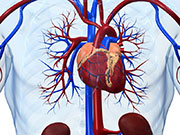ICDs lead to extended survival in those at high risk for sudden cardiac death, less so for those over 70
WEDNESDAY, Feb. 11, 2015 (HealthDay News) — Implantable cardioverter-defibrillators (ICDs) may not benefit all patients to the same degree, as their effectiveness seems to diminish somewhat with the advancing age of the patient, according to a review published online Feb. 10 in Circulation: Cardiovascular Quality Outcomes.
Paul Hess, M.D., a clinical fellow in the department of cardiology at the Duke University Medical Center in Durham, N.C., and colleagues noted that more than 40 percent of ICD patients are 70 or older at the time they undergo surgery. More than 10 percent are 80 or older. By contrast, almost 90 percent of the 3,500 participants enrolled in the five studies under review were under the age of 75. And while patient age ranged from under 55 to well over 75, the overall average age of the patient pool was just 62. Roughly half the participants received an ICD because they had been deemed at high risk for sudden cardiac death. The other half did not have the device implanted. Each patient was tracked for an average of 2.6 years.
During that time, more than a fifth of those who received an ICD died, compared to more than a quarter of those who did not get an ICD. Overall, the researchers found that those who got ICDs were less likely to die than those who did not, seemingly regardless of age. However, the researchers also said that ICDs seem to offer poorer survival rates among older patients, perhaps because older patients tend to have additional health complications alongside heart disease. And the researchers warned that given the small pool of older patients, it could not be ruled out that ICDs may actually provide little or no survival benefit among patients over the age of 70.
“We really need more studies to look at this question more carefully so we can shed some light on how ICDs work among older patients,” Hess told HealthDay. “Meanwhile, I would say that it’s possible that chronological age may not be the only important measure to consider, that how healthy a person is and how large their burden of additional disease — what we call ‘biologic age’ — may be really important to take into account when considering whether an ICD is right for someone in their 70s or older.”
Copyright © 2015 HealthDay. All rights reserved.








